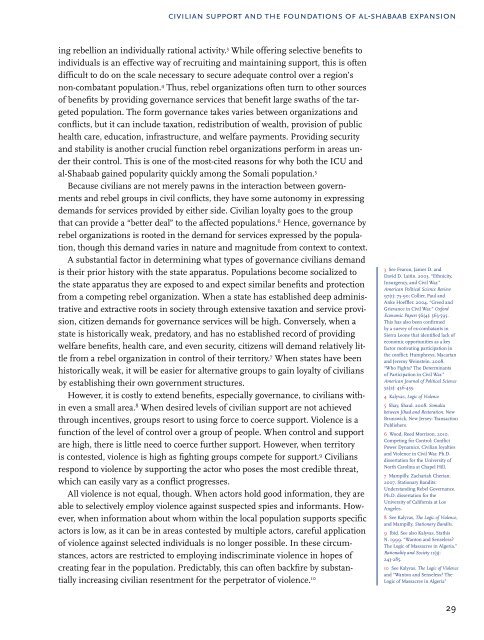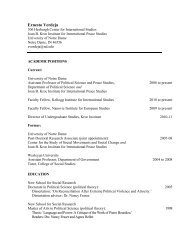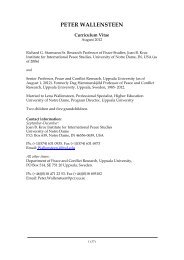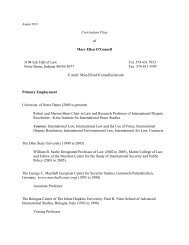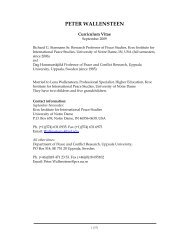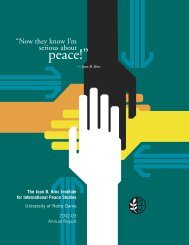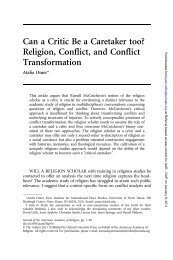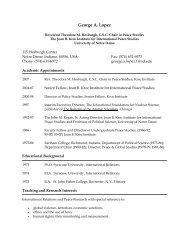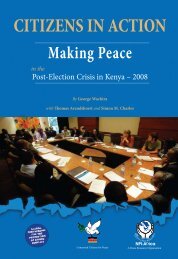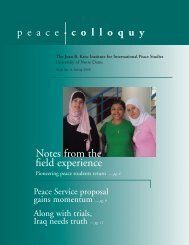Somalia: Creating Space for Fresh Approaches to Peacebuilding
Somalia: Creating Space for Fresh Approaches to Peacebuilding
Somalia: Creating Space for Fresh Approaches to Peacebuilding
Create successful ePaper yourself
Turn your PDF publications into a flip-book with our unique Google optimized e-Paper software.
civilian support and the foundations of al-shabaab expansion<br />
ing rebellion an individually rational activity. 3 While offering selective benefits <strong>to</strong><br />
individuals is an effective way of recruiting and maintaining support, this is often<br />
difficult <strong>to</strong> do on the scale necessary <strong>to</strong> secure adequate control over a region’s<br />
non-combatant population. 4 Thus, rebel organizations often turn <strong>to</strong> other sources<br />
of benefits by providing governance services that benefit large swaths of the targeted<br />
population. The <strong>for</strong>m governance takes varies between organizations and<br />
conflicts, but it can include taxation, redistribution of wealth, provision of public<br />
health care, education, infrastructure, and welfare payments. Providing security<br />
and stability is another crucial function rebel organizations per<strong>for</strong>m in areas under<br />
their control. This is one of the most-cited reasons <strong>for</strong> why both the ICU and<br />
al-Shabaab gained popularity quickly among the Somali population. 5<br />
Because civilians are not merely pawns in the interaction between governments<br />
and rebel groups in civil conflicts, they have some au<strong>to</strong>nomy in expressing<br />
demands <strong>for</strong> services provided by either side. Civilian loyalty goes <strong>to</strong> the group<br />
that can provide a “better deal” <strong>to</strong> the affected populations. 6 Hence, governance by<br />
rebel organizations is rooted in the demand <strong>for</strong> services expressed by the population,<br />
though this demand varies in nature and magnitude from context <strong>to</strong> context.<br />
A substantial fac<strong>to</strong>r in determining what types of governance civilians demand<br />
is their prior his<strong>to</strong>ry with the state apparatus. Populations become socialized <strong>to</strong><br />
the state apparatus they are exposed <strong>to</strong> and expect similar benefits and protection<br />
from a competing rebel organization. When a state has established deep administrative<br />
and extractive roots in society through extensive taxation and service provision,<br />
citizen demands <strong>for</strong> governance services will be high. Conversely, when a<br />
state is his<strong>to</strong>rically weak, preda<strong>to</strong>ry, and has no established record of providing<br />
welfare benefits, health care, and even security, citizens will demand relatively little<br />
from a rebel organization in control of their terri<strong>to</strong>ry. 7 When states have been<br />
his<strong>to</strong>rically weak, it will be easier <strong>for</strong> alternative groups <strong>to</strong> gain loyalty of civilians<br />
by establishing their own government structures.<br />
However, it is costly <strong>to</strong> extend benefits, especially governance, <strong>to</strong> civilians within<br />
even a small area. 8 When desired levels of civilian support are not achieved<br />
through incentives, groups resort <strong>to</strong> using <strong>for</strong>ce <strong>to</strong> coerce support. Violence is a<br />
function of the level of control over a group of people. When control and support<br />
are high, there is little need <strong>to</strong> coerce further support. However, when terri<strong>to</strong>ry<br />
is contested, violence is high as fighting groups compete <strong>for</strong> support. 9 Civilians<br />
respond <strong>to</strong> violence by supporting the ac<strong>to</strong>r who poses the most credible threat,<br />
which can easily vary as a conflict progresses.<br />
All violence is not equal, though. When ac<strong>to</strong>rs hold good in<strong>for</strong>mation, they are<br />
able <strong>to</strong> selectively employ violence against suspected spies and in<strong>for</strong>mants. However,<br />
when in<strong>for</strong>mation about whom within the local population supports specific<br />
ac<strong>to</strong>rs is low, as it can be in areas contested by multiple ac<strong>to</strong>rs, careful application<br />
of violence against selected individuals is no longer possible. In these circumstances,<br />
ac<strong>to</strong>rs are restricted <strong>to</strong> employing indiscriminate violence in hopes of<br />
creating fear in the population. Predictably, this can often backfire by substantially<br />
increasing civilian resentment <strong>for</strong> the perpetra<strong>to</strong>r of violence. 10<br />
3 See Fearon, James D. and<br />
David D. Laitin. 2003. “Ethnicity,<br />
Insurgency, and Civil War.”<br />
American Political Science Review<br />
97(1): 75-90; Collier, Paul and<br />
Anke Hoeffler. 2004. “Greed and<br />
Grievance in Civil War.” Ox<strong>for</strong>d<br />
Economic Papers 56(4): 563-595.<br />
This has also been confirmed<br />
by a survey of ex-combatants in<br />
Sierra Leone that identified lack of<br />
economic opportunities as a key<br />
fac<strong>to</strong>r motivating participation in<br />
the conflict; Humphreys, Macartan<br />
and Jeremy Weinstein. 2008.<br />
“Who Fights? The Determinants<br />
of Participation in Civil War.”<br />
American Journal of Political Science<br />
52(2): 436-455.<br />
4 Kalyvas, Logic of Violence<br />
5 Shay, Shaul. 2008. <strong>Somalia</strong><br />
between Jihad and Res<strong>to</strong>ration. New<br />
Brunswick, New Jersey: Transaction<br />
Publishers.<br />
6 Wood, Reed Morrison. 2010.<br />
Competing <strong>for</strong> Control: Conflict<br />
Power Dynamics, Civilian loyalties<br />
and Violence in Civil War. Ph.D.<br />
dissertation <strong>for</strong> the University of<br />
North Carolina at Chapel Hill.<br />
7 Mampilly, Zachariah Cherian.<br />
2007. Stationary Bandits:<br />
Understanding Rebel Governance.<br />
Ph.D. dissertation <strong>for</strong> the<br />
University of Cali<strong>for</strong>nia at Los<br />
Angeles.<br />
8 See Kalyvas, The Logic of Violence,<br />
and Mampilly, Stationary Bandits.<br />
9 Ibid. See also Kalyvas, Stathis<br />
N. 1999. “Wan<strong>to</strong>n and Senseless?<br />
The Logic of Massacres in Algeria.”<br />
Rationality and Society 11(3):<br />
243-285.<br />
10 See Kalyvas, The Logic of Violence<br />
and “Wan<strong>to</strong>n and Senseless? The<br />
Logic of Massacres in Algeria”<br />
29


